

SEMBLE the game of resemblance. This post is a web translation of my presentation to the National Digital Forum, Wellington, NZ, on 20 November 2012.
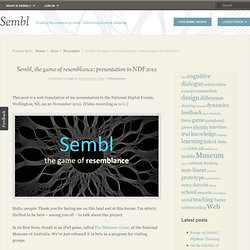
(Video recording is here.) Hello, people. Thank you for having me on this land and at this forum. I’m utterly thrilled to be here – among you all – to talk about this project. Bankstreet - Museum Education Programs Overview. Which program is right for you?
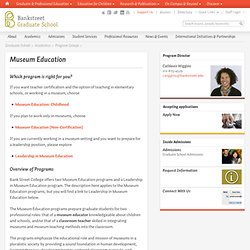
If you want teacher certification and the option of teaching in elementary schools, or working in a museum, choose Museum Education: Childhood If you plan to work only in museums, choose Museum Education (Non-Certification) If you are currently working in a museum setting and you want to prepare for a leadership position, please explore. Creative Learning Factory. 5 quick and dirty tricks for the terminally busy researcher. MuseumEd Principles. Museum Education Roundtable. Museum Education Roundtable. The Museum Education Roundtable is proud to serve the field through publication of The Journal of Museum Education.
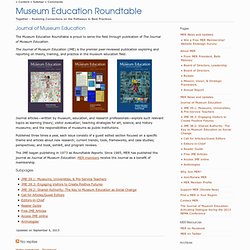
The Journal of Museum Education (JME) is the premier peer-reviewed publication exploring and reporting on theory, training, and practice in the museum education field. Journal articles—written by museum, education, and research professionals—explore such relevant topics as learning theory; visitor evaluation; teaching strategies for art, science, and history museums; and the responsibilities of museums as public institutions. Published three times a year, each issue consists of a guest edited section focused on a specific theme and articles about new research; current trends; tools, frameworks, and case studies; perspectives; and book, exhibit, and program reviews. The JME began publishing in 1973 as Roundtable Reports. Museum Learning Collaborative Homepage. Museum learning. This article or section is a stub.
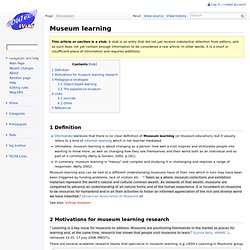
A stub is an entry that did not yet receive substantial attention from editors, and as such does not yet contain enough information to be considered a real article. In other words, it is a short or insufficient piece of information and requires additions. 1 Definition DSchneider believes that there is no clear definition of Museum learning (or museum education), but it usually refers to a kind of informal learning which is not teacher mediated. Enhancing pupil learning on museum visits. Learning in Museums?
The game of resemblance: presentation to NDF2012. LEM - The Learning Museum Network Project — LEM Project. Museums, libraries and archives - learning - Home. MUSEUM EDUCATION. M. Christine Castle - About the Museum Education Monitor. Consultant & Educator Museum Education Monitor.
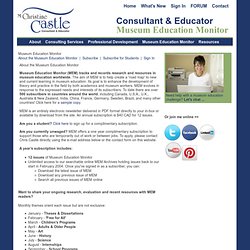
FORUM - Ongoing museum education research. Talk at the edge of museum education and digital media. Smithsonian: Museum Studies: “Rewarding Museum Participation and Learning: New Approaches” [Expletive Deleted] Ed-Tech #Edinnovation. I was a keynote speaker at this week's Ed-Tech Innovation conference in Alberta, Canada, and the transcript from that talk is below.
![[Expletive Deleted] Ed-Tech #Edinnovation](http://cdn.pearltrees.com/s/pic/th/expletive-deleted-edinnovation-57035523)
I wanted to give a talk that expressed my deep gratitude to Canadian educators and researchers -- particularly those that created MOOCs -- alongside my concerns about the rewriting of education technology history that diminishes, if not erases altogether, their contributions. It's a larger problem too, I'd argue, with many tech entrepreneurs laying claim to education innovation with nary a reference or a nod to those who've shaped the field.
It's disingenous and dishonest and deeply, deeply troubling as how we frame the past helps us think about the direction of the future. Oh and it pisses me off too. Clearly. On November 4, 1979 a group of Islamist students and militants took over the US Embassy in Tehran, Iran. In order to rescue the 6, a CIA agent named Tony Mendez devised a ruse that would explain their presence in Iran. “Argo fuck yourself,” indeed. Hack Education Ed-Tech Guide. British Museum joins Futurelearn. Four more universities have announced plans to offer massive open online courses via the UK-based Futurelearn platform, taking the total number of higher education institutions involved to 21.
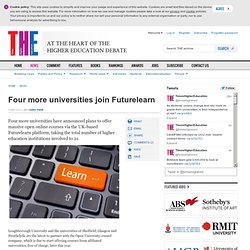
Loughborough University and the universities of Sheffield, Glasgow and Strathclyde are the latest to partner with the Open University-owned company, which is due to start offering courses from affiliated universities, free of charge, later this year. In addition, the British Museum has signed up to work with Futurelearn, following the lead of the British Library, which partnered with the Mooc provider in February, and the British Council. “We are delighted that more of the UK’s leading universities, along with one of its most popular cultural institutions, have agreed to work with Futurelearn,” said Simon Nelson, chief executive of Futurelearn, who told Times Higher Education in March that more university partners were set to be announced. chris.parr@tsleducation.com Click to rate. The Mobile Native. St. Marys City Schools Mobile Learning Technology. The official mobilelearning Daily.
Judy Brown - Home. iPads in Education. iPads in Education Daily. iPads and Tablets in Education. MuseumEd Assessment. 15 innovations that will alter the face of higher education. High schools, community colleges, and four-year institutions will create early-college/dual-degree courses better aligned to the college curriculum.
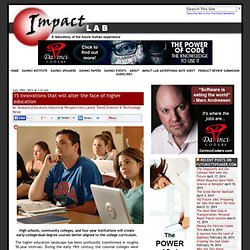
The higher education landscape has been profoundly transformed in roughly 50-year intervals. During the early 19th century, the colonial colleges were joined by several hundred more religiously founded institutions. The mid-19th century saw the rise of public colleges, culminating in the Morrill Act of 1862. The turn of the 20th century witnessed the emergence of the modern research university as well as the articulation of the Wisconsin Idea, that public universities should serve the public, as well as the appearance of extension services. MuseumEd books amazon. Learning. Usable Knowledge: Learning in museums. Museums and other informal learning settings can invite students to become engaged in exhibits and activities.
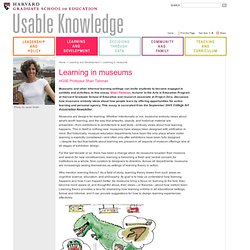
In this essay, Shari Tishman, lecturer in the Arts in Education Program at Harvard Graduate School of Education and research associate at Project Zero, discusses how museums embody ideas about how people learn by offering opportunities for active learning and personal agency. This essay is excerpted from the September 2005 College Art Association Newsletter. Museums are designs for learning. What is museum learning? Museums are the Future of Education. Earlier this year, I shared some thoughts regarding the future of education with face-to-face and on-line attendees at Museums Advocacy Day.
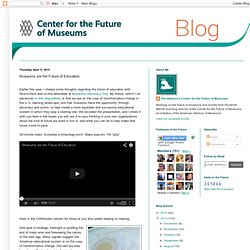
My thesis, which I’ve advanced on this blog before, is that we are on the cusp of transformative change in the U.S. learning landscape, and that museums have the opportunity, through advocacy and action, to help create a more equitable and successful educational system in which they play a starring role. We recorded the presentation, and I share it with you here in the hopes you will use it to spur thinking in your own organizations about the kind of future we want to live in, and what you can do to help make that future come to pass.
Transforming youth from digital consumers into digital makers. You know that joke about how a liberal arts degree will get you a job as a barista at Starbucks? I’ve been thinking about what our education prepares us for in the work world. I’m not the only one. There is a growing movement that advocates for youth to be trained for the digital work world. But why do the ‘digital native’ generation need training? Don’t they intuitively understand everything digital? The Report The Nominet Trust recently commissioned a report by Dr Julian Sefton-Green Mapping Digital Makers: a review exploring everyday creativity, learning lives and the digital . Nominet Trust launched the report with a panel on digital making and youth which they recorded. Schools vs. Why am I telling you about this report and movement?
Museums Are Already Doing It Museums can and already do offer programs for kids interested in learning more about digital making. New Museum in New York is living up to their cutting edge reputation with a workshop encouraging coding literacy. Tools. Mapping digital makers. Why Museums Can Excel in Online Learning. “The recent development of MOOCs (massive open online courses) can provide museums with valuable possibilities for education, community outreach and multi-disciplinary collaboration.” The quote above by David Greenfield, a doctoral candidate in Learning Technologies at Pepperdine University, was part of a paper entitled “MOOCs, Museums, and Schools: Natural Partners and Processes for Learning” presented at the recent Museums & the Web Conference in Portland theorizing about the potential of partnerships with schools and community members in developing online museum courses. Museums are already starting to realize those possibilities in the area of online courses.
The Museum of Modern Art, the Tate and my own North Carolina Museum of Art are currently offering extended online courses similar to MOOCs. Why Museums Can Excel Online MoMA educator Deborah Howes filming a segment for MoMA Online Courses in front of a Nam June Paik piece. JOLT - Journal of Online Learning and Teaching. Sheppard - insistent questions. Rewarding Museum Participation and Learning: New Approaches, “Rewarding Museum Participation and Learning: New Approaches,” a symposium on digital badging.